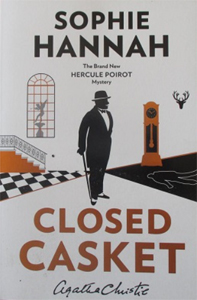A mystery novel can go off the rails if the author piles on too many implausibilities at the end. Sophie Hannah, in her second Christie-estate-approved Poirot novel “Closed Casket” (2016), does something rather ingenious. She puts the insane things up front; thus the narrative coasts to a rather likely conclusion.
But not a dull one by any means. Once Poirot gathers everyone in the sitting room to explain what happened, I was hopeless for doing anything other than finishing the book.
Gathered at the manor
As with “The Mysterious Affair at Styles” and many other Christie books, all our potential victims and suspects and detectives are gathered at one huge manor. In this case, it’s Lillieoak, the estate of children’s mystery author Lady Athelinda Playford, in rural Ireland.

“Closed Casket” (2016)
Author: Sophie Hannah
Series: New Hercule Poirot Mysteries No. 2
Genre: Mystery
Setting: 1929, Clonakilty, Ireland
England’s island neighbor was, rather surprisingly, never a popular location for a Christie novel. But Hannah doesn’t add much Irish flavor beyond the locale’s name, Clonakilty, and the inept police detective’s names, Conree and O’Dwyer. On the other hand, the setting means Poirot and his Scotland Yard friend and narrator, Catchpool, can solve the crime almost as a vacation hobby.
The bizarre inciting incident is this: Lady Playford announces over dinner that she is changing her will. Everything will go to her secretary, Joseph Scotcher, rather than to her son, Harry, and daughter, Claudia (and their respective significant others, Dorro and Dr. Kimpton).
Scotcher has only a short time to live due to a kidney ailment. Thus, it seems pointless for Lady Playford to change the will, since she will likely outlive Scotcher. If she does, the assets revert to the previous recipients: her offspring.
Colorful cast of characters
Under the keystrokes of a lesser writer, Lady Playford would be quickly bumped off — and indeed she fears she has made herself a target. But Hannah knows what she’s doing. She’s interested in exploring the psychology of the characters – as Poirot himself often is.
Structurally, the author devises a finely layered plot. I was impressed by how thoroughly Poirot and Catchpool (and sometimes others) discuss clues and theories, often mentioning things a reader might not think of. And yet there’s still a secret explanation lurking below the surface.
The characters are the strengths, though – and they are well-named. Lady Playford writes playful mystery novels about Shrimp Seddon – like Nancy Drew but even younger. Scotcher is a compulsive liar, with many people suspecting he’s faking his physical ailment, but Hannah doesn’t chastise him for this; rather, she approaches it as a mental-health issue rather than a moral issue.
The author doesn’t go out of time to do this (although admittedly there isn’t a substantial 1929 flavor to the events); many characters do dislike Scotcher for his actions. But overall, “Closed Casket” sees him as an object of fascination rather than a pathetic schemer. I’ve known at least one person with this condition, and I can confidently say he was not a bad person, and not even trying to scheme anything out of the people he lied to. It simply was a mental-health problem.

Kimpton has a room-filling demeanor, and his banter with off-and-on-again fiancée Claudia is entertaining. Even the most minor characters in the assembly of a dozen make an impression, at least on the level of humor. Lady Playford’s lawyer Orville Rolfe amusingly complains about the small sizes of chairs and soup bowls, oblivious to his corpulence.
Poirot closes it with flair
Hannah borrows a page from Christie’s “Sleeping Murder” by openly announcing that a text – Shakespeare’s “King John” in this case – provides a clue. I’m unfamiliar with the play, so it was no spoiler for me; perhaps it is for scholars of the Bard.
In the end, “Closed Casket” is itself a rich text – with the richness coming from the plot and the characterizations. While he has an unusual amount of competition in memorable personalities, Poirot takes the spotlight at the right time.
Hannah’s personal strengths, and one minor weakness (the de-emphasis of a time-and-place flavor) make this a Hannah book more than a Christie book. Yet the worldly Poirot is versatile enough to fit into Hannah’s world, in which narrator Catchpool is the lynchpin.
Assuming most Christie fans like a good mystery no matter the author, they’ll have a hard time closing “Closed Casket” before they’re finished.
Sleuthing Sunday reviews an Agatha Christie book or adaptation. Click here to visit our Agatha Christie Zone.

